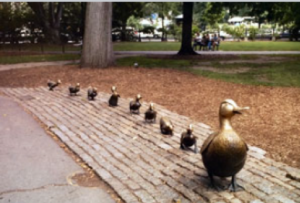With this fifth blog, we are coming to the end or our series on digital teaching tools. We hope that you’ve been inspired by some of the American Studies links ranging from the heart-warming and hilarious antics of humans and animals to the more scholarly posts on Academic Earth.

Google Lit Trips
By Carolyn Blume
“Travel is fatal to prejudice, bigotry, and narrow-mindedness.” Mark Twain
During a time when physical travel options are necessarily limited, Google Lit Trips offer an opportunity to engage in virtual field trips. A Google Lit Trip consists of three basic elements:
- Google Earth
- A literary work in English from kindergarten through college
- Interactive resources that connect the piece of literature to its setting.
Developed by individual teachers, each Google Lit Trip serves as a multimedia literary journey, embedding actual locations with excerpts from novels, videos, still images, and related textual resources along with guiding questions or tasks for (time and space) travelers. Take a trip to Boston with Make Way For Ducklings, to Alabama in 1963 with The Watsons Go To Birmingham, or to the post-apocalyptic U.S. with Cormac McCarthy’s The Road.
Google Lit Trips are a nonprofit, free-to-use resource surprisingly not affiliated with Google.
https://www.googlelittrips.org/
* * *
The American Yawp
By Andreas Hübner
Teaching American History digitally, scholars have always had multiple resources to choose from, especially if they were looking for additional archival material. The Smithsonian, the Library of Congress, and the National Archives, to name but a few, all provide access to historical images, books, and manuscripts. Yet, in times of COVID-19, scholars also have to reconsider the accessibility of textbooks, usually housed on the shelves of university libraries or purchased by students, mostly at horrendous prices.
Thus, I started to look at different options and came across The American Yawp. To educators of American history, The American Yawp offers an excellent alternative to traditional non-open access publishing ventures. Edited by historians Joseph L. Locke and Ben Wright, The American Yawp provides all the readings that an American history instructor could hope for: from the early colonization of the American continent to American politics after 9/11. In addition, The American Yawp offers a complimentary primary source reader, including a broad range of teaching materials: syllabi, key terms, quizzes, essay assignments, and even exemplary exams. Looking at the range of materials available, historians are certainly ready to kick off your online American history survey class.
Links
Website: http://www.americanyawp.com/
Primary Source Reader: http://www.americanyawp.com/reader.html
Teaching: http://www.americanyawp.com/text/teaching-materials/
Smithsonian: https://www.si.edu/
National Archives: https://www.archives.gov/
Library of Congress: https://www.loc.gov/
* * *
The British Library – American Style
By Michaela Keck
Believe it or not, the British Library houses one of the world’s largest collections of U.S. books – ranging from the earliest colonial period to the present day – as well as magazines, musical scores, maps, journals, and loads of digital resources: https://www.bl.uk/collection-guides/american-collections.
Of course, the British Library is also one of the world’s finest on British culture and literature. This link provides readers with online resources sorted by centuries, offering materials that range from scholarly articles to films and visual culture as well as teachers’ notes. Even though canonical authors and their works are prominent and the target audience of the teachers’ materials are high school rather than university students, I found that these resources include excellent scholarly articles combined with historical (visual) documents about the Romantics, Gothic fiction, or the representation of drugs in the 19th century. As my examples show, I mainly teach 19th century literature, and even though I specialize in American Studies, I have found this website a valuable as well as appealing resource for my Bachelor students.
17,868 Total Views, 11 Views Today






